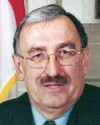Mr. Speaker, I am pleased that a ceasefire has been reached successfully in Yugoslavia, and a peace plan put in place that will ensure the return of the Kosovar refugees to their country.
We can only hope that the Yugoslav president will honour his commitments, although this has not been his wont.
I should point out that we have nothing against the Serbs, the only enemy of humanity is the Milosevic regime.
We hope that Serbia and the Federal Republic of Yugoslavia will rejoin the community of nations as soon as possible. There is no doubt that the NATO action was justified by the necessity to see human rights win out over barbarism.
We therefore supported the government's resolution to endorse the NATO air strikes, even if we are as opposed to the use of force as many other Quebecers. This resolution was not, however, a good representation of the need to find short, medium and long term solutions to the political problem behind the conflict between the Kosovar people and the Federal Republic of Yugoslavia.
In recent months we have witnessed one of the most disturbing human tragedies since the second world war: ethnic cleansing, deportation and dispossession of close to one million Kosovars, who have been deprived on both a number of civil rights and their right to self-government by the Milosevic regime for some ten years now. This is what has led to the tragedy we now see unfolding before our very eyes daily on our television screens.
But there is now cause for celebration: the war and destruction are over, and the era of peace and reconstruction is beginning.
How can this peace be built?
A number of problematic issues must be addressed and complex political challenges faced, for the political stability of the entire Balkan region is at stake.
For example, there are many questions yet to be resolved concerning the status of what is legally a Serb province, which will come under the administration of the United Nations, and an international military protectorate. Under what conditions will the return of the Kosovar refugees from Albania, Macedonia, Bosnia, Montenegro and all of the other countries that have, along with Canada, opened their doors to them?
After all, with all the abuse and atrocities perpetrated by the Serbian troops and soldiers in Kosovo, there is no question of putting the Albanian Kosovar population at the mercy of the Serb political powers in Belgrade yet again.
What will happen to the charges of war crimes and crimes against humanity against Slobodan Milosevic and his acolytes by the international criminal court?
Will the Yugoslav government benefit from international reconstruction aid that will be offered while President Milosevic is in power?
Will Montenegro take advantage of its courageous position against the Milosevic regime in recent months and decide its status freely or will we abandon Montenegro to its fate and allow the Serbian president to tighten his grip on this tiny republic?
What will happen to the ethnic minorities in all of the countries in the region?
We are pleased that the UN has finally played a role in resolving the Kosovo crisis. Unfortunately, the UN has shown itself incapable, initially, of preventing Serbia from violating the collective and human rights of the Kosovars and of finding a quick solution to the conflict.
This proves two things. First, the UN is incapable, in its present form, of resolving regional conflicts and that its institutions and its operations must be significantly reformed. Canada should call for such a reform as a member of the UN Security Council.
Second, it proves that, in the absence of such reform, regional or intergovernmental military organizations will increasingly have to take whatever action they deem necessary to ensure international security and the respect of human rights.
The triumph of the democratic countries will reaffirm that we are moving into a new era of international law in which despots, tyrants, terrorists and dictators have to understand that they no longer have the immunity they thought they enjoyed.
Moreover, charging Slobodan Milosevic will remind those responsible for crimes against humanity, torture or terrorism that they cannot escape justice.
Before I conclude, let me return to the proposals I made in April.
As quickly as possible, following the reinstatement of the individuals and collective rights of the Kosovar people, I suggest that Canada, with other members of the Organization on Security and Co-operation in Europe, the OSCE, promote an international conference on the status and rights of ethnic minorities in Europe, and specifically in the Balkans.
In the short term we must also target the sources of instability in the Balkans, namely the difficult economic situation of the countries in the region and the feeling of exclusion from major European political institutions. In this regard, we must recognize the wisdom of the position adopted in early April by the foreign ministers of the European Community.
These countries agreed to set up a fund of at least 250 million Euros to establish a security pact for the Balkans. This fund for Balkan countries would be tied to partnership agreements with the European community, including on issues such as economic assistance and trade privileges. So, this is a step in the right direction.
Following that, we will have to go further and integrate interested Balkan countries into the European community and NATO. This is necessary to ensure Europe's stability, the region's prosperity and the security of Europe's economic and military partners.
In closing, I congratulate and thank the men and women of the armed forces, who showed us their great courage and sense of responsibility, as well as members of NGOs, non-government agencies, from Canada and Quebec, who made a valuable contribution during these difficult times.











